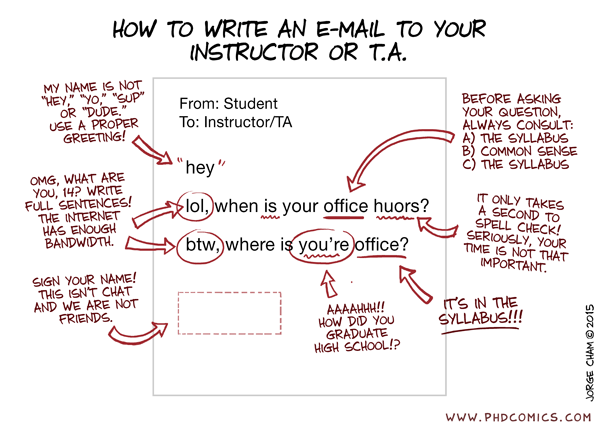Last term, I sat on a graduate scholarship committee for the first time in a few years. I noticed a few common errors, and at the encouragement of a colleague, I have turned this experience into the blog post you are now reading.
Many scholarship applications will require a brief research proposal. Here are some things you should think about if you have to include a proposal in your application:
- The proposal has to be well written. If you’re not naturally a good writer, show your proposal to someone who is. Bad spelling and grammar reflect badly on you. Poorly constructed sentences and paragraphs that obscure the point you are trying to make are even worse. They suggest that you don’t care enough to proofread your work carefully and/or to get someone to proofread it for you. This advice of course extends to other parts of your application.
- It should be clear how your work fits in a larger context. Here’s a made-up example: Student X wants to synthesize molecules containing some weird new functional group. That’s great, but unless you explain it to me, I don’t know why anyone would want to do that. Are these molecules theoretically interesting? Do they have potential applications? Do they extend our knowledge of chemistry in a new direction, and if so, what is that direction and why should I care? This comment is, of course, more general than the example above, and would extend to a proposal to prove a theorem, to study distant galaxies, etc.
- Almost all scholarships and postdoctoral fellowships are judged by panels of non-experts, so write your proposal for a general scientific audience. In part, this connects to my previous point: It may seem self-evident to you why you would want to study protein Y, and perhaps it is to people in your field, but it may not be obvious to a scientist outside of your field. Beyond that, you need to define non-obvious abbreviations, avoid highly specialized jargon if possible, etc.
- The proposal’s scope should align with the level at which you are applying. Don’t propose 20 years of work in an M.Sc. application. Don’t propose something very limited (in time and/or intellectually) in a Ph.D. or postdoc proposal. The latter is a surprisingly common (and fatal) error. We might forgive the over-eager M.Sc. applicant, but we can’t forgive a Ph.D. applicant whose proposal doesn’t look exciting. If you are competing for a scholarship, you are competing with other people who have proposals that have some real intellectual interest. If you are making systematic measurements of some property, unless you tell me otherwise, it might look like work for a technician.How does your work tie in to major theories in your field? What is the potential for it to change how we think about certain issues? Do you need to develop new measurement methods that will be more broadly applicable?
Some Canadian (especially Tri-Council) scholarship applications ask you to comment on your most significant contributions. Other scholarship competitions may ask for something like this with different wording. Such a section is not about why the work is significant to you. It is about the significance of your work to your field. In some cases, especially if you’re just getting started in research, your most significant contribution may be a conference presentation. If it is, nobody cares that you really enjoyed presenting your work to leaders in your field. What we care about is if your work represents a real advance. Interest from leaders in your field may be evidence of that, especially if they followed up with you after your talk. But the emphasis is on what they got out of it, not what you got out of it. If you can, try to tell us how your work requires new thinking about some issue or other in your field. Or maybe tell us how your work opens up new vistas. The same goes for publications. I’m sure it was exciting to get your paper published in the Elbonian Journal of Science, but what I really care about is the science in the paper, and whether you can tell me why it was important. (In fact, I probably care more about whether you are effectively communicating the importance of your work than whether I fully buy your argument. When I sit on these committees, I’m evaluating you. One of the things I want to know is whether you can craft a coherent argument.) Since you probably don’t have any experience writing this kind of text, it is imperative that you get an experienced pair of eyes (e.g. your supervisor’s) on this section of your application.
Many scholarship applications will ask for a summary of most recent completed thesis (or equivalent). When an application has a section like this, we expect you to use most of the space to tell us about your past work. What did you do? How did you do it? Why was this a hard thing to do? What was learned? And yes, why was it important? If you write three lines when we gave you a page, it’s not good. You need to give us some details here. It’s your work. You should be able to was poetic about it.
In fact, as a rule, you should use most of the space allowed for any given part of your application, provided of course the section is relevant. (On occasion, there will be sections that you can’t use. For example, if you’re asked to list publications and you don’t have any, you clearly can’t use this space.) Don’t make stuff up, but not having much to say about yourself or your work is generally considered a negative.
Academia is slowly becoming more progressive. Accordingly, most scholarship applications will have a section in which you can talk about any obstacles life threw in your way, good or bad, that might have affected your performance. I know that some people are afraid of using these sections, but in fact you should if there is something we should know about. We are genuinely trying to take life circumstances into account when we evaluate scholarship applications, among other things. The kinds of things you might want to let us know about include having a disability (that you could document on request), taking time off to start a family, having to look after a sick parent or child, and so on. If anything has held you back from taking a full course load, completing a degree in the “usual” amount of time, or negatively affected your grades over some period of time, let us know. We can’t take it into account if we don’t know about it.
Maybe I can close with a bit of general advice: The best way to learn to write good proposals is to work with someone who has been successful at this skill. Ask your supervisor or other mentors who are more advanced than you to look over what you have produced. Take their advice to heart. Don’t take it personally if they are very critical. In fact, you should especially thank the people who are very critical of your applications. They’re usually the ones who are giving you the most important feedback.

